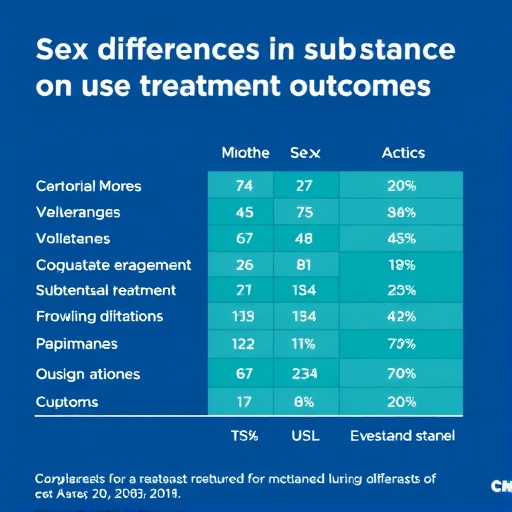In a groundbreaking study published in Biological Sex Differences, researchers have unveiled compelling evidence surrounding the efficacy of substance use disorder treatment through the lens of social determinants of health (SDOH). The focus of their investigation was to explore the nuances of how sex differences can significantly affect treatment outcomes in individuals struggling with substance use disorders. This timely research provides critical insights that could reshape existing treatment protocols and inform future interventions aimed at improving recovery rates across different populations.
Traditional approaches to managing substance use disorders have often overlooked the intricate interplay of gender and social factors. The study by Chavez, Peltier, and McKee aims to fill this gap by analyzing how variables such as socioeconomic status, education, and community support can influence recovery paths differently for men and women. This approach recognizes that individuals are not merely defined by their substance use but are also shaped by their life experiences, including their social contexts.
Through a meticulous review of existing literature and an original data analysis from various clinical settings, the authors gathered a robust dataset that allows them to draw informed conclusions. Their findings reveal that the success of treatment programs is, in fact, profoundly intertwined with social determinants. Women, for instance, may face unique challenges that hinder their recovery due to societal expectations and caretaking responsibilities, while men may be affected differently due to cultural norms around masculinity that discourage seeking help.
The culmination of this research illustrates a clear demand for gender-sensitive approaches in treatment design. Strategies that take into account the specific social pressures and supports available to each gender not only enhance the effectiveness of the interventions but can also foster a more inclusive environment for recovery. For instance, treatment programs that offer flexible hours to accommodate parenting duties or community-based support groups can significantly improve engagement for women, who disproportionately bear the burden of domestic roles.
Another significant revelation from the study highlights the role of socioeconomic disparities in treatment access and outcomes. Individuals from lower socioeconomic backgrounds frequently experience multiple barriers that can exacerbate their substance use issues. These can include limited access to healthcare, inadequate insurance coverage, and a lack of supportive community resources. The authors emphasize that without addressing these foundational social issues, the healthcare system might perpetuate cycles of disadvantage that hinder recovery efforts.
Moreover, the research demonstrates that stigma associated with substance use disorder remains a pervasive barrier for all genders, but its impact can vary significantly. Women may encounter heightened stigma, particularly in contexts where societal norms equate motherhood with moral virtue, leading to feelings of shame or reluctance to seek help. In contrast, men may confront stigma related to perceived weakness when accessing treatment, potentially resulting in a higher likelihood of disengagement from recovery services.
The findings of this study not only contribute to academic discourse but also hold real-world implications for healthcare professionals and policymakers. They provide a clarion call for the necessity of integrating gender-sensitive practices into substance use disorder treatment. As the landscape of substance use continues to evolve, the one-size-fits-all model of treatment must be reconsidered in favor of tailored strategies that acknowledge the diverse experiences of individuals based on their gender and social circumstances.
Ultimately, this research opens up new avenues for exploration, suggesting future studies could expand upon these findings by incorporating a broader range of social determinants. Exploring the intersections between race, economic status, and geographic location might further illuminate the complexities of substance use disorder treatments, ensuring that no demographic remains underserved. As the field continues to grow, the hope is that these insights will transform how clinicians approach treatment, leading to elevated standards of care that directly address the social barriers contributing to substance use disorders.
In summary, the work of Chavez, Peltier, and McKee represents a significant advancement in understanding the interplay of gender and social determinants in substance use disorder treatment outcomes. Their findings not only illuminate critical disparities faced by different sexes but also advocate for methodological shifts in treatment strategies that could lead to more effective recovery protocols. The implications of their research extend beyond academic circles, emphasizing the urgent need for changes in policy and practice that prioritize the unique needs of individuals based on gender and social context.
In conclusion, this landmark study lays the groundwork for a more inclusive and effective approach to addressing substance use disorders. By recognizing and understanding the diverse experiences shaped by social determinants of health, the healthcare community can move towards creating more effective interventions that resonate with all individuals on their path to recovery. This research underscores the importance of ongoing dialogue in the field and the necessity for evidence-based practices that address the systemic issues influencing treatment outcomes.
Subject of Research: Sex differences in the impact of social determinants of health on substance use disorder treatment outcomes.
Article Title: Sex differences in the impact of social determinants of health on substance use disorder treatment outcomes.
Article References: Chavez, C.L.J., Peltier, M.R. & McKee, S.A. Sex differences in the impact of social determinants of health on substance use disorder treatment outcomes. Biol Sex Differ 16, 56 (2025). https://doi.org/10.1186/s13293-025-00734-3
Image Credits: AI Generated
DOI: 10.1186/s13293-025-00734-3
Keywords: substance use disorder, treatment outcomes, social determinants of health, gender differences, recovery pathways, stigma, socioeconomic status, healthcare policy, gender-sensitive approaches, community support.




